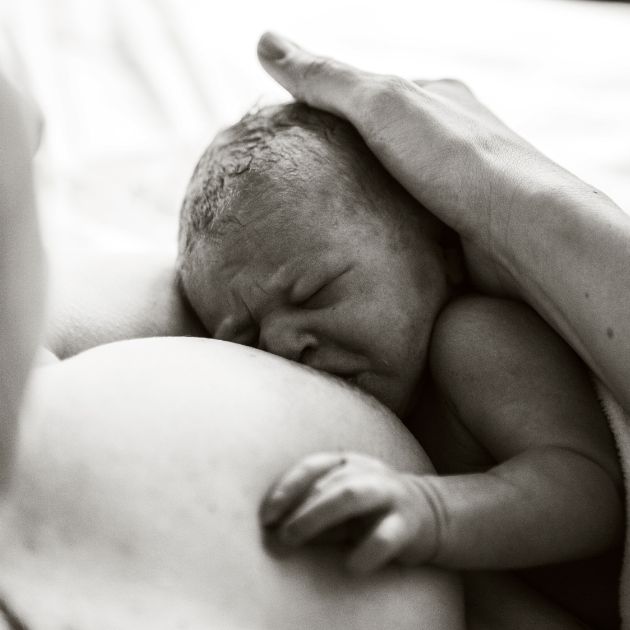Did you know the average baby born in the United States weighs 7.5 lbs? For such a tiny person, you might start wondering why your newborn is constantly hungry!
Around three weeks old, our daughter developed the most insatiable appetite. No matter how much she ate, the hunger cues would start again only minutes after a feed.
She acted like she was starving, and we couldn’t figure out where she was storing the extra milk or why she wanted it in the first place!
From growth spurts to tummy trouble, your baby might be breastfeeding or formula-feeding more than usual for several reasons. While you could easily brush the topic off as a “normal baby thing,” figuring out the cause of their constant hunger will help you determine whether something needs to be done about it.
For example, if your baby’s non-stop signs of hunger are from cluster feeding, you’ll likely need to just let the experience ride. Other times, your infant’s eating habits might stem from medical issues like dairy allergies or colic.
So, if you want the answers to your questions about your baby’s appetite, stick around.
Below you’ll find a list of common reasons babies might seem constantly hungry, along with the information you need to know about what to do about them.

This site contains affiliate links, meaning that we earn a small commission for purchases made through our site. We only recommend products we personally use, love, or have thoroughly vetted.
- If Your Baby is Always Hungry, Is Milk Supply an Issue?
- Is It Cluster Feeding When Your Newborn is Hungry Every Hour?
- Do Babies Want to Eat More When They Have GERD?
- Newborn Constantly Hungry and Crying: Could it Be Colic?
- Is a Witching Hour Affecting Your Infant’s Appetite?
- Should You See a Pediatrician About Your Baby’s Eating Habits?
- Navigating Cluster Feeds and Other Newborn Issues
If Your Baby is Always Hungry, Is Milk Supply an Issue?
Let’s get this one out of the way–most of the time, your breastfeeding baby’s need for extra feeds has NOTHING to do with low milk supply.
In fact, all those extra nursing sessions will even increase your milk production!
While fear of not making enough milk is the number one reason many of us stop breastfeeding, statistics show that only 5% of mamas actually struggle with supply issues.
As long as your baby shows signs of getting enough breast milk, such as weight gain, proper development, and plenty of dirty diapers, you probably don’t have anything to worry about.
If your baby starts showing signs of infant dehydration, this can also indicate the possibility of supply problems. Be on the lookout for symptoms such as:
- Dry Mouth
- Sunken Fontanelle (Your Baby’s Soft Spot)
- Sunken Eyes
- Tearless Crying
Is It Cluster Feeding When Your Newborn is Hungry Every Hour?
Ahh, cluster feeding–a newborn phenomenon that pops up for most breastfed and formula-fed babies. Unfortunately, this parenting milestone is rarely discussed.
At least I didn’t feel like I got the proper warning before my baby started eating non-stop during the evening hours!
Cluster feeding is an experience that pops up for many babies when they’re going through growth spurts or learning to sleep through the night. You might notice it at three or six weeks of age or three or six months old.
As your baby goes through these transitional periods, they’ll start pining for more milk to satisfy their need for fuller bellies and extra calories.
Don’t be alarmed if your little one starts to cluster–it’s normal behavior for babies!
Usually, a baby’s cluster will last for two or three days and happens most frequently during the later afternoon or evening hours.

Do Babies Want to Eat More When They Have GERD?
When our eldest was little, we struggled with many tummy troubles.
One thing we noticed was instances of non-stop eating, followed by obvious belly discomfort. Our daughter would give us all the usual baby hunger cues, like rooting and putting her fist in her mouth, but act like she was in pain afterward.
Eventually, our pediatrician told us gastro-esophageal reflux disease (GERD) was probably part of the problem. Babies will sometimes act hungry when they have reflux because they want to wash down any acid in their throats.
GERD can develop because the muscle between a newborn’s esophagus and stomach isn’t fully formed yet.
Another common factor is lactose intolerance in babies, as was the case with our daughter. If you’re a breastfeeding mama, this might require a transition into dairy-free breastfeeding.
Newborn Constantly Hungry and Crying: Could it Be Colic?
Ahhhhh, colic: the catch-all of unknown baby ailments.
Have you ever noticed that when many of us don’t understand infant behavior, we often lean on colic as the obvious answer? After all, many parents often misunderstand colic.
While the cause of colic is unknown, if your baby has it, you might notice frequent bouts of intense crying. In most healthy babies, it may feel like they’re crying for no particular reason.
I’m not talking about typical fussiness: colic cries are much more intense. If your baby is dealing with this condition, it might even seem like they’re in pain. Some other side effects of colic include:
- Muscle Tension, i.e., stiff arms and legs or an arched back
- Screaming
- Clenched Fists
- Facial Discoloration or Blushing
Often, colic also follows predictable timing patterns. For instance, your little one might cry for hours every afternoon for no apparent reason.
But what does colic have to do with a newborn who’s constantly hungry?
Some babies with colic act like they want to eat all the time. Experts believe this has little to do with a genuine hunger and more with the comfort they get from sucking reflexes.
If this is the case for your little one, you can offer them a pacifier instead. Below is a list of the best pacifiers for soothing infants:
- Phillips AVENT Soothie
- MAM Comfort Baby Pacifier
- Tommee Tippee Ultra-Light Silicone Pacifier
- RaZbuddy Jolly Pop Pacifier
White noise is another great option for soothing your baby during these challenging moments. You can use apps on your phone or purchase a sound machine.
Is a Witching Hour Affecting Your Infant’s Appetite?
Here’s another one that sometimes gets confused with colic–the witching hour! While this might sound spooky and sinister, I assure you, it’s perfectly normal and nothing to concern yourself with!
Common in new babies, the witching hour consists of long periods of crying during the evening. As with colic, you might notice your little one wanting to eat more to comfort themselves during the process.
Parenting professionals believe this phenomenon stems largely from overstimulation and fatigue during those early months of life, especially since the fussiness usually hits right before bedtime.
Your newborn might start experiencing a witching hour around two to three weeks old. Lucky for you, though, it usually peaks around eight weeks old!
Should You See a Pediatrician About Your Baby’s Eating Habits?
As you can see, you might have an extra hungry baby on your hands for several reasons. That said, most are relatively normal and nothing to worry about.
That doesn’t mean, however, that you should ignore your mama instincts and avoid making an appointment with your baby’s doctor or a lactation consultant if you’re concerned about their feeding routine.
Not only can healthcare professionals help you identify any medical causes for your baby’s increased appetite, but they can also provide suggestions on getting through the process.
Simple changes, like switching to a new infant formula or using a swaddle, might be all it takes to help your baby through its troubles.
You should also be on the lookout for warning signs of more significant issues, such as:
- Signs of Dehydration
- Not Gaining Weight or Weight Loss
- Red or Black Colors in Poop or Vomit
- Less Dirty Diapers than Normal
- Acting Lethargic
- Repeated Vomiting or Diarrhea

Navigating Cluster Feeds and Other Newborn Issues
Obviously, your baby is the primary concern when you’re wondering about their ravenous eating habits, but let’s not forget that you’re affected, too!
Whether discussing breastfed or bottle-fed babies, the sudden need to keep up with non-stop feeds might feel exhausting, especially when you’re struggling with increased crying, too!
While I don’t recommend ignoring your baby’s cries and needs for food, I encourage you to take care of yourself simultaneously—simple steps, like having your partner take over a few feeds or practicing self-care.
Also, keep in mind most of the issues mentioned above are temporary. While they might seem impossible to handle, many resolve naturally within a couple of weeks or months.
So, whether you think your little one is battling colic, dealing with a cluster feed, or simply wants some extra love and comfort, have faith that this non-stop eating pattern is just one small chapter in your parenting journey.
And remember, if you’re worried about your baby’s feeding schedule, it’s never a “bad idea” to make an appointment with their pediatrician just in case.
Does it currently seem like your newborn is constantly hungry? If so, do any of the possibilities above apply?










